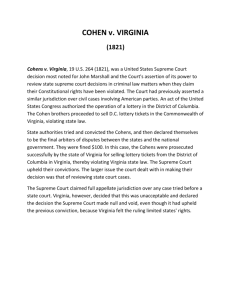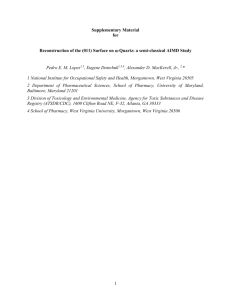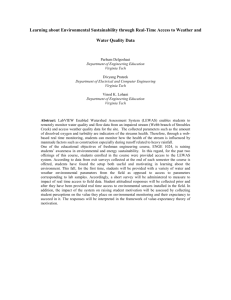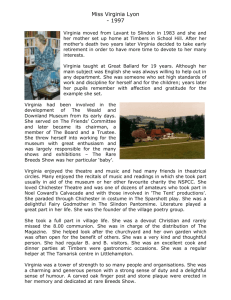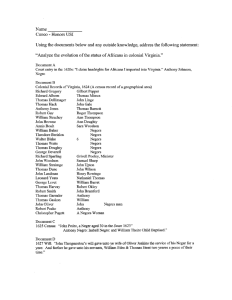Brief
advertisement
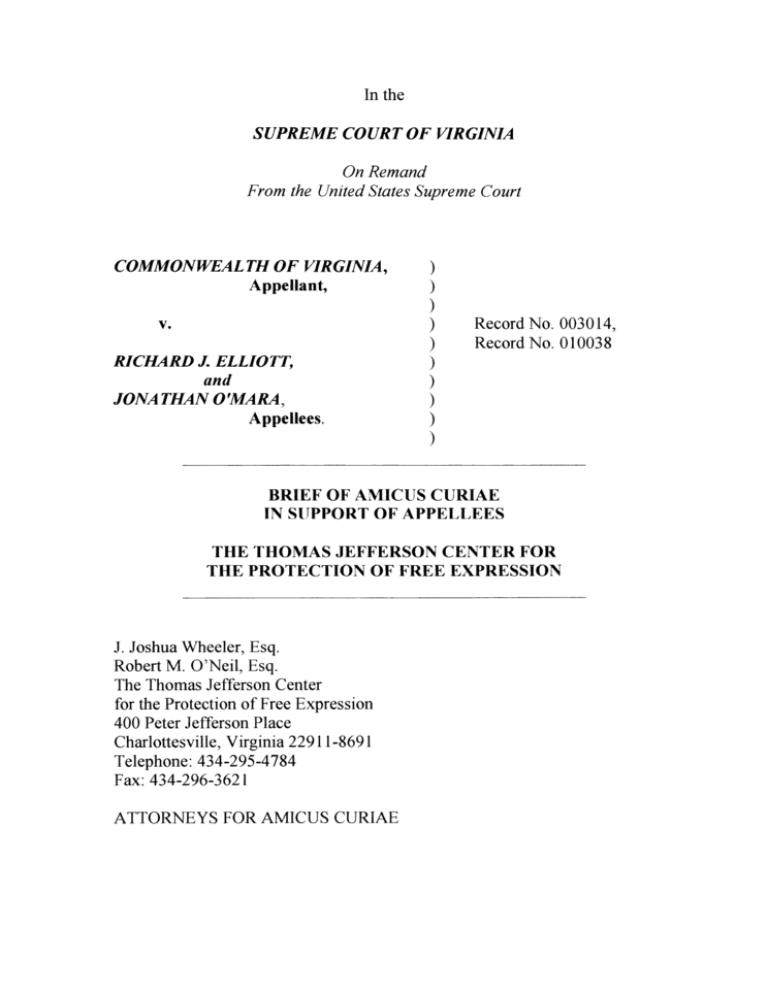
In the SUPREME COURT OF VIRGINIA On Remand From the United States Supreme Court COMMONWEALTH OF VIRGINIA, Appellant, v. ) ) ) ) RICHARD J. ELLIOTT, and JONATHAN o 'MARA, Appellees. ) ) ) ) ) ) Record No. 003014, Record No. 010038 BRIEF OF AMICUS CURIAE IN SlJPPORT OF APPELL"EES THE THOMAS JEFFERSON CENTER FOR THE PROTECTION OF FREE EXPRESSION J. Joshua Wheeler, Esq. Robert M. O'Neil, Esq. The Thomas Jefferson Center for the Protection of Free Expression 400 Peter Jefferson Place Charlottesville, Virginia 22911-8691 Telephone: 434-295-4784 Fax: 434-296-3621 ATTORNEYS FOR AMICUS CURIAE TABLE OF CONTENTS TABLE OF AUTHORITIES ii ~SSI<=J]\J~1'JTS O~ ~~O~ 1 QUESTIONS PRESENTED 1 STATE~NT 2 N~TURE OF INTEREST OF AMICUS C-URIAE OF THE C~SE AND STATE~MENT OF F~CTS 3 Sl-T~~~ O~ A~<=J~l\JT 3 AR<=JU~NT 5 I. VIR<=JINIA MAY - AND INDEED DOES - CONSTRUE THE CONSTITUTION~L <=JU~RANTEE OF FREE EXPRESSION IN ~RTICLE I, § 12 MORE B~OADL Y THAN THE NATIONAL FIRST A~l\fJ:)~NlL RE~U~S 5 A. The Virginia Constitution tolerates the expression of disfavored views to a greater extent than the First Amendment of the United States Constitution B. Virginia Code § 18.2-423 is an overly broad statute that violates both the Virginia Constitution and the First ~mendment to the l-Tnited States Constitution 8 11 II. THE U.S. SUPRE~ COURT H~S DETERMINED TH~T VIR<=JINIA CODE § 18.2-423 ENCOMPASSES SITU~ TIONS INVOLVIN-<=J THE INCITE~1'JT OF OTHE~S TO EN<=J~<=JE IN UNL~ WFUL BEHAVIOR AND, AS SUCH, THE STATUllE MUST CO:MPORT WITH THE STANDARDS SET FORTH IN BRANDENBUR<=J V. OHIO 17 CONCLU'SION 20 1 TABLE OF AUTHORITIES Cases: Black~ et. ale v. Virginia, 262 Va. 764,553 S.E. 2d 738 (2001) . ............................................................................ 9, 10, 13, 14, 15, 16, 17, 18, 19 Brandenburg v. Ohio, 395 U.S. 444 (1969) 2, 4, 5, 17, 19 Hudgens v. .NLRB, 424 U.S. 507 (1976) 6 Lloyd Center v. Tanner, 407 U.S. 551 (1972) 6 Pruneyard Shopping Center v. Robbins, 447 U.S. 74 (1980) 4,5 R.A. V. v. St. Paul, 505 U.S. 377 (1992) 10 Richmond Newspapers v. COM, 222 Va. 574,281 S.E. 2d 915 (1981) Robert v. City ofNorfolk, 188 Va. 413,49 S.E. 2d 697 (1948) 7 5,7 Smith v. United States, 431 U.S. 291 (1977) 6 State v. Henry, 302 Ore. 510,732 P.2d 9 (1987) 6 Virginia v. Black, 123 S. Ct. 1536 (2003) Watts v. United States, 394 U.S. 705 (1969) 3, 10, 11, 13, 14, 16, 18, 19,20 18 Constitional: U.S. Const. Amend. I 6, 7, 8,19,20 'VA. Const. Art. I, § 12 4, 5,7,17,20 11 Statutory: Code of Virginia: Virginia Code § 18.2-423 -it:) CO,-tCl 1.1.U.~-.~-J.V..l. Q I') _,11') '2 1\ 1 "ll611..lJ.U. U""' R ~ \ , ~t'"n~li passim ••••••••••••••••••••••••••••••••••••••••••••••••••••••••••••••••••••• 1~t:)ClCI~~1"" pUt.:)~J...l..1. Oii,er: Black's Law Dictionary (6 th ed. 1990) 12 Linda Greenhouse, Justices Allow Bans on Cross Burnings Intended as Threats, N.Y. Times, Apr. 8, 2003, at AI 11 Edward Walsh, State Bans on Cross Burning Upheld, Wash. Post, Apr. 8,2003, at Al 11 Virginia Commission on Constitutional Revision, Report ofthe Commission on Constitutional ~R.e~'isiorl (1969) 7 Virginia Model Jury Instructions, Criminal (1988 and Supp. 2001) 111 13 ASSIGNMENTS OF ERROR This case is on remand from the United States Supreme Court. Rather than Assignments of Error, therefore, the issues in this case are those presented in the Order of this Court dated August 29, 2003. QUESTIONS PRESENTED Listed below are the five questions presented in the Order of this Court dated August 29, 2003. In this brief, however, amicus curiae will only specifically address questions 4 and 5. 1. Is the prima facie provision of Code § 18.2-423 facially invalid or unconstitutional? 2. If it is facially invalid or unconstitutional, is the final sentence of Code § 18.2-423 severable from the remainder of the statute? (a) Assuming it is possible to sever the prima facie aspect of the statute, is it possible or permissible to do so given the .procedural posture of the case? (b) Has the Commonwealth preserved the right to request severing of the prima facie aspect of Code § 18.2-423? 3. If the final sentence is not amenable to an interpretation that would render it constitutional, but it is severable, could Richard J. Elliott and Jonathan O'Mara be retried under § 18.2-423? More specifically, should the Court order (a) that Elliott's and/or O'Mara's convictions stand with no right to a retrial, (b) that Elliott's and/or O'Mara's are vacated, but the Commonwealth may retry either or both appellants, or (c) that Elliott's and/or O'M:ara's convictions are vacated, but the Commonwealth may not retry either or both defendants? 4. Does Code § 18.2-423 comport with the "Brandenburg standard" articulated by the Supreme Court of the United States in Brandenburg v. Ohio, 395 U.S. 444, 89 S. Ct. 1827, 23 L. Ed. 2d 430 (1969)? 5. Is Code § 18.2-423 valid in consideration of the free speech and expression guarantees of the Virginia Constitution articulated in Article I, § 12? STATEMENT OF INTEREST OF AMICUS CIJRIAE The Thomas Jefferson Center for the Protection of Free Expression is no stranger to this case. The Center filed briefs as amicus cllriae in this matter in the Circuit Court of Carroll County, the Virginia Court of Appeals, the Virginia Supreme Court, and the United States Supreme Court. As such, the Center is well versed in the facts and important issues that this case presents. 2 The Center is a nonprofit, nonpartisan organization in Charlottesville, Virginia. Founded in 1990, the Center has as its sole mission the protection of free speech and press against threats in many forms and has pursued that mission through litigation involving free speech and press in state and federal courts across the country. NATURE OF THE CASE AND STATEMENT OF FACTS Defendant Richard J. Elliot was convicted of attempted cross burning under Virginia Code § 18.2-423. For the same incident, defendant Jonathan O'Mara pled guilty to attempted cross burning but reserved the right to challenge the constitutionality of Virginia Code § 18.2-423 on appeal. In a third case involving a different incident, defendant Barry Black was convicted of violating Virginia Code § 18.2-423 forbuming a cross as part of a Ku Klux Klan rally. All three defendants appealed challenging the constitutionality of the Virginia statute. This Court found Virginia Code § 18.2-423 facially invalid under the First Amendment to the United States Constitution. The United States Supreme Court affrrmed the dismissal of charges against defendant Black, but remanded the cases of defendants Elliott and O'Mara. In an Order issued on August 29, 2003, this Court directed the parties to address the five specific questions listed above. SUMMARY OF ARGUMENT 3 Although the United States Supreme Court's ruling in Virginia v. Black, 123 S. Ct. 1536 (2003) forecloses any further proceedings in this matter against defendant Black, the Court left open the possibility of further proceedings against defendants Elliott and 0 'Mara, including retrial in the Circuit Court on the original charges under Virginia Code § 18.2-423. Amicus curiae does not address the question of whether such a retrial should now occur, nor does amicus address the issue of the severability of the statute, assuming that the parties will fully address those issues. The focus of this brief is on two issues of paramount importance represented by Questions 4 and 5 in this Court's Order of August 29, 2003; namely, whether or not Va. Code § 18.2-423 comports with the constitutional requirements set forth in Brandenburg v. Ohio, 395 u.s. 444 (1969), and the validity of the statute in consideration of the free speech and expression guarantees of the Virginia Constitution articulated in Article I, § 12. Central to amicus' response is the principle that, in a federal system such as ours, the courts of each state may define the guarantees of their own constitutions so as to protect activity or expression which the Constitution of the United States may not protect. Pruneyard Shopping Center v. Robbins, 447 U.S. 74 (1980). The federal constitutional guarantees, in short, establish a floor below which states may not fall, but do not impose a ceiling which 4 states may not exceed. The import of this principle is especially clear and meaningful for Virginia, since this Court has declared that "the Constitution of Virginia is broader than that of the U.S. in providing that - 'any citizen may freely speak, write and publish his sentiments on all subjects. '" Robert v. City ofNorfolk, 188 Va. 413,42, 49 S.E. 2d 697,700 (1948) (quoting VA. Const. Art. I, § 12 ). Pursuant to such recognition of Virginia's special solicitude for expressive rights, amicus respectfully urges this Court to declare Va. Code § 18.2-423 to be facially invalid, particularly given the inescapable presence in the statute of the clearly unconstitutional prima facie provision. Amicus also urges this Court to declare that Va. Code § 18.2-423 fails to meet constitutionally acceptable standards for the regulation of advocacy or incitement of unlawful conduct, as set forth by the United States Supreme Court in Brandenburg v. Ohio. ARGUMENT I. VIRGINIA MAY - AND INDEED DOES - CONSTRUE THE CONSTITUTIONAL GUARANTEE OF FREE EXPRESSION IN ARTICLE I, § 12 MORE BROADLY THAN THE NATIONAL FIRST AMEN"DMENT REQ"UIRES. The United States Supreme Court has made unmistakably clear that in a federal system such as ours, state courts are free to protect the rights of their citizens more fully than the Bill of Rights demands. That latitude 5 applies particularly to freedom of speech and press, as the Supreme Court recognized in Pruneyard Shopping Center v. Robbins, 447 U.S. 74 (1980), where the California Supreme Court's state constitution-based protection for expressive activity in privately owned malls and shopping centers was sustained, despite the lower standard which the Supreme Court had applied under the First Amendment in cases such as Lloyd Center v. Tanner, 407 U.S. 551 (1972) and Hudgens v. NLRB, 424 U.S. 507 (1976). The central premise of Pruneyard is that a state may not in its regulation of speech fall below the "floor" that federal constitutional law guarantees, but is in no way prevented from affording to its own citizens a degree of protection that exceeds the "ceiling" which adherence to federal standards would create. Thus, in a different expressive area, states may criminalize the distribution of obscenity to consenting adults, as most (including Virginia) have chosen to do. But if a state chooses, as Oregon h.as chosen, to make such distribution lawful within its borders, see State v. Henry, 302 Ore. 510, 732 P.2d 9 (1987), and to rest its judgment on the state constitution's provisions, that is an option which a state enjoys within a federal system. The resulting variation among standards - even between federal and state prosecutions in a state that has decriminalized the distribution of obscene materials to consenting adults, see Smith v. United States, 431 U.S. 291 6 (1977), are an inevitable result of the latitude that our federal system gives to states. Such latitude exists even though a state's courts may often describe parallel federal and state guarantees as coextensive. Thus the view expressed by Virginia's lower courts at earlier stages in this case that the federal and state free-expression guarantees are coextensive in no way preclu.des on remand the adoption of a more protective standard of free speech for Virginians under the state constitution. Whatever may be the case with respect to facts determined at an earlier stage of litigation, to which principles of res judicata surely apply, no such barrier exists to reopening the quest for the most appropriate source of constitutional law. The opportunity to protect speech more broadly under a state's constitution is one that has special meaning for Virginians. For more than a half century, this Court has made clear that "the Constitution of Virginia is broader than that of the U.S. in providing that - 'any citizen may freely speak, write and publish his sentiments on all subjects, '" Robert v. City of Norfolk, 188 Va. 413,420 (1948) (quoting VA. Const. Art. I, § 12). More recently, this Court expressly based a free press ruling on Article I, § 12 reflecting the view expressed by the state Commission on Constitutional Revision that parallels between federal and state guarantees offered "no 7 good reason not to look first to Virginia's Constitution for the safeguards of fundamental rights of Virginians." Rich/nond Newspapers v. COM, 222 Va. 574,580,281 S.E. 2d 915,922 (1981)(quoting Report ofthe Commission on Constitutional Revision, p. 86 (1969)). Thus the opportunity to protect expression more fully than the First Amendment requires is not only available in theory; more to the point, it is an opportunity that this Court has seized and pursued. Recognizing that the Virginia Constitution may provide greater protection for speech than that provided by the u.s. Constitution, the question immediately arises as to what aspects of free speech are insufficiently protected by the latter in regards to Va. Code § 18.2-423? The answer is two-fold: the tolerance for expression of differing viewpoints, even those as abhorrent as the racial and religious bigotry symbolized by a burning cross, and the chilling of protected expression by an overbroad statute. A. The Virginia Constitution tolerates the expression of disfavored views to a greater extent than the First Amendment of the United States Constitution. On the issue of viewpoint discrimination, the difference between the state and federal constitutions is one of degree, not kind. While the First Amendment to the U. S. Constitution goes far in limiting government's ability to legislate its preferences for and against particular viewpoints, it does not provide the degree of tolerance for differing views that is inherent in the Virginia Constitution. When this case was originally before this Court, a number of conclusions were made regarding the viewpoint discriminatory purpose and effect of the Virginia statute. While not specifically stating that race, color, creed, religion, or gender is the subject of proscription, the absence of such language in the Virginia statute does not mask the motivating purpose behind the statutory prohibition of cross burning. Black, et. ale v. Virginia, 262 Va. 764, 774, 553 S.E. 2d 738, 744 (2001) (citations omitted)(emphasis added). [C]onsidering the historical and current context of cross burning, and the statute's reliance on such context for the provision of an inference of intent to intitnidate from the mere act of burning a cross, it is clear that the Commonwealth's interest in enacting the cross burning statute is related to the suppression of free expression as well. Id. at 775,553 S.E. 2d at 744 (emphasis added). The historical context for the passage of the Virginia cross burning statute is uncontrovertible. In an atmosphere of racial, ethnic, and religious intolerance, the General Assembly acted to combat a particularly virulent form of intimidating speech. Id. at 776,553 S.E. 2d at 746 (emphasis added). 9 During oral argument, the Commonwealth maintained that the portion of the statute proscribing the burning of a cross had nothing to do with the motivation of the actor. When asked how the Commonwealth could justify the inference of intimidation provided in the last sentence of the statute, the Commonwealth relied upon the historical context ofcross burning. The Commonwealth cannot have it both ways. Id. (emphasis added). None of these conclusions are challenged by the U.S. Supreme Court's decision in this matter. In its review of the case, the u.s. Supreme Court simply determined that the language of the statute met the minimum requirements for viewpoint neutrality as set forth in RA }iT v.St. Paul, 505 u·.s. 377 (1992). See Virginia v. Black, 123 S. Ct. 1536, 1549 (2003). In reaching its conclusion, the U.S. Supreme Court pla.ced far greater reliance than this Court on the fact that the Virginia statute did not contain explicit language demonstrating a viewpoint bias. Id. Yet this analysis only explains why the statute might be constitutionally permissible under RA V; in no way does it change this Court's conclusions regarding the discriminatory purpose behind the Virginia General Assembly's passage of the act. The fact that RA V may tolerate a neutrally worded but viewpointbased statute does not mean that RA V requires such tolerance. This Court, having already found that the statute's purpose was the suppression of free speech, should feel free to exercise its allthority to hold that such a 10 viewpoint-based statute violates the Virginia Constitution. Such a holding would send the unequivocal message that, in Virginia, the prohibition of viewpoint discriminatory statutes cannot be avoided by mere wordplay. This message would be particularly effective in circumstances, such as those in the present case, where the hann sought to be prevented can be achieved through legislation that does not implicate the rights enunciated in Article I, § 12 of the Virginia Constitution. Indeed, after the U.S. Supreme Court granted certiorari in this matter, the General Assembly drafted and passed Va. Code § 18.2-423.01 (2002), a statute that raises few, if any, of the free speech concerns caused by Va. Code § 18.2-423. B. Virginia Code § 18.2-423 is an overly broad statute that violates both the Virginia Constitution and the First Amendment to the United States Constitution. When the U.S. Supreme Court issued its decision in this case, many of the press headlines declared that that the high Court had upheld Va. Code § 18.2-423. See, e.g., Edward Walsh, State Bans on Cross Burning Upheld, Wash. Post, Apr. 8, 2003, at AI; Linda Greenhouse, Justices Allow Bans on Cross Burnings Intended as Threats, N.Y. Times, Apr. 8,2003, at AI. In fact, a plurality of the U.S. Supreme Court found the entire statute unconstitutional on its face. This fmding was based on the statute's prima facie provision as interpreted by a jury instruction issued in the trial of Barry 11 Black. Virginia v. Black, 123 S. Ct. at 1551-52. Although the charges against defendant Black were dismissed, the U.S. Supreme Court remanded the case against defendants Elliot and O'Mara because no interpretation of the prima facie provision had been issued by Virginia courts in either of their respective legal proceedings. Id. at 1550. The remand would give this Court the opportunity to authoritatively interpret the meaning of the prima facie provision. Specifically, this Court would now be allowed to determine "whether any interpretation of the prima facie evidence provision would satisfy the First Amendment." Id. at 1552 (emphasis in original). Also true is that the remand allows this Court the opportunity to determine if Va. Code § 18.2-423 violates the Virginia Constitution. The prima facie provision of Virginia Code § 18.2-423 states: "Any such burning of a cross shall be prima facie evidence of an intent to intimidate a person or group of person." Black's Law Dictionary defines "prima facie evidence," in relevant part, as follows: Evidence good and sufficient on its face. Such evidence as, in the judgment of the law, is suflicient to establish a given fact ... which if not rebutted or contradicted, will remain sufficient. Evidence which, if unexplained or uncontradicted, is sufficient to sustain a judgment in favor of the issue it supports, but \vhich may be contradicted by other evidence. Black's Law Dictionary, 1190 (6th ed. 1990). 12 In the case of Barry Black, the jury was given the following instruction concerning the prima facie provision: "The burning of a cross, by itsel(~ is sufficient evidence from which you may infer the required intent." Virginia v. Black, 123 S. Ct. at 1550. In its review of the case, the U.S. Supreme Court held that the jury instruction in Black was a clear violation of the First Amendment. "[T]he prima facie evidence provision can 'skew jury deliberations toward conviction in cases where the evidence of intent to intimidate is relatively weak and arguably consistent with a solely ideological reason for burning. '" Id. at 1551 (The Black plurality of four was quoting the opinion of Justice Souter which was joined by two other Justices. Thus, seven members of the Court shared this view of the jury instruction's interpretation of the prima facie provision.) Given the task of reviewing the jury instruction, however, it is difficult to conceive of a reasonable but different interpretation of the prima facie provision. N"or, apparently, could the drafters of The Virginia Model Jury Instructions whose model instruction for Va. Code § 18.2-423 is the same as the one issued in the Black trial. See yTirginia v. Black, 123 S. Ct. at 1550 (citing Virginia Model Jury Instructions, Criminal, Instruction No. 10.250 (1988 and Supp. 2001). Further, the plain language of the provision 13 leaves police and law enforcement personnel no discretion as to who to arrest under the statute. As this Court stated in it review of the provision, "the act of burning a cross alone, with no evidence of an intent to intimidate, will nonetheless suffice for arrest and prosecution and will insulate the Commonwealth from a motion to strike the evidence at the end of its case­ in-chief." Black, 262 Va. at 778, 553 S.E.2d at 746. The U.S. Supreme Court left no doubt of its view on whether the prima facie provision could have a chilling effect on the expression of protected speech: The act of burning a cross may mean that a person is engaging in constitutionally proscribable intimidation. But the same act may mean only that the person is engaged in core political speech. The prima facie evidence provision in this statute blurs the line between these two meanings of a burning cross. As interpreted by the jury instrllction, the provision chills constitutionally protected political speech because of the possibility that a State will prosecute--and potentially convict--somebody engaging in lawful political speech at the core of what the First Amendment protects. Virginia v. Black, 123 S. Ct. at 1551. The high Court's concern that the prima facie provision creates an increased probability of arrest and prosecution which, in tum, creates a. chilling effect on protected expression, is a clear affirmation of a finding previously made by this Court: 14 That the trier of fact ultimately finds the actor not guilty of the offense is little consolation after arrest and prosecution for speech or expressive conduct that is otherwise protected. Arrest for, and prosecution of, otherwise protected speech, with no evidence of a critical element of the offense other than a statutorily supplied inference, chills free expression. Black, 262 Va. at 778,553 S.E.2d at 746. It is important to note that in making the foregoing statement, this Court was not evaluating the jury instruction given in Barry Black's trial but the prima facie provision itself. Yet this Court's assessment of the effect of the provision is virtually identical to the U.S. Supreme Court's assessment of the effect of the jury instruction. As such, it is evident that the prima facie provision cannot be reasonably construed in a manner substantively different than the jury instruction given in defendant Black's trial. -Under the First Amendment analysis employed by both Courts, therefore, the prima facie provision renders Va. Code § 18.2-423 unconstitutionally overbroad. In his concurrence to the plurality opinion in Black, Justice Scalia challenged the plurality's conclusion that the mere threat that individuals engaged in protected expressive conduct will be subject to arrest and prosecution suffices to render a statute overbroad. "Rather, our overbreadth jurisprudence has consistently focused on whether... individuals who engage in protected conduct can be convicted under a statute, not whether they 15 might be subject to arrest and prosecution." Virginia v. Black, 123 S. Ct. at 1554 (Scalia, J., concurring) (emphasis in original). Only one other Justice agreed with Justice Scalia on this point. Id. at 1552 (Thomas, J., concurring). But even if it were held that Va. Code § 18.2-423 was not overbroad under the First Amendment, the findings of this Court strongly indicate that the statute reaches expression protected by the Virginia Constitution. As noted above, this Court found that, for one wishing to engage in protected expression, the possibility of being found not guilty does not diminish the chilling effect of a statute that so easily allows for arrest and prosecution for such expression. Black, 262 Va. at 778, 553 S.E.2d at 746. The substance of that fmding is not altered by legal analysis; one's exercise of protected expression will be chilled even if such a statute is found not to violate the First Amendment. The right of free speech should be defmed more by substance than procedure. Having already determined that the chilling effect of Va. Code § 18.2-423 was severe enough to warrant the lesser protection of the First Amendment, this Court should invoke the greater protection of the Virginia Constitution to prevent the harm caused by this overbroad. statute. 16 II. THE U.S. SUPREME COURT HAS DETERMINED THAT VA. CODE § 18.2-423 ENCOMPASSESS SITUATIONS INVOLVING THE INCITEMENT OF OTHERS TO ENGAGE INU~LAWFUL BEHAVIOR AND, AS SUCH, THE STATUTE MUST COMPORT WITH THE STANDARDS SET FORTH IN BRANDENBURG V. OHIO. In its prior review of the instant matter, two members of this Court found that Va. Code § 18.2-423 did not meet the constitutional standards for punishing advocacy of unlawful behavior set forth in Brandenburg v. Ohio. Black, 262 Va. at 779,553 S.E.2d at 747 (Kinser, J., concurring). A majority of this Court, however, specifically declined to address the issue. The rationale for that decision was understandable--addressing the issue was llnnecessary because the Court had already found the statute unconstitutional under the First Amendment on grounds of viewpoint discrimination and overbreadth. Id. at 778, 553 S.E. 2d at 746. On remand, it is again unnecessary for this Court to address the Brandenburg question because, as discussed above, the statute violates Article I, § 12 of the Virginia Constitution. Should this Court nonetheless choose to consider this issue, amicus would urge this Court to find that Va. Code § 18.2-423 does not comport with the Brandenburg standard. Given this Court's Order of August, 2003, however, it can well be expected that the parties will fully address this issue. As such, amicus feels it would be of greater assistance to this Court to 17 briefly address a more narrow but critical aspect of the question; specifically, whether Va. Code § 18.2-423 is limited to criminalizing the making of "true threats" as articulated in Watts v. United States, 395 U.S. 705 (1969) (per curiam) and therefore does not even trigger the Brandenburg analysis. See Black, 262 Va. at 781,553 S.E.2d at 748 (Hassell, J., dissenting). Despite not directly addressing this question, a plurality of the U.S. Supreme Court has implicitly already answered it in the affirmative. In.deed, the proof is in the pudding as evidenced by the high Court's affirmation of this Court's decision to reverse the conviction of Barry Black for violating Va. Code § 18.2-423. In making this decision, it is clear that the U.S. Supreme Court was troubled by the fact that the statute's reach extended to actions such as those committed by defendant Black. The prima facie provision makes no effort to distinguish among... different types of cross burning. It does not distinguish between a cross burning done with the purpose ofcreating anger or resentment and a cross burning done with the purpose of threatening or intimidating a victim. It does not distinguish between a cross burning at a public rally or a cross burning on a neighbor's lawn. It does not treat the cross burning directed at an individual differently from the cross burning directed at a group oflike-minded believers. It allows a jury to treat a cross burning on the property of another with the owner's acquiescence in the same manner as a cross burning on the property of another without the owner's permission. 18 Virginia v. Black, 123 S. Ct. at 1551 (emphasis added). Each of the cross burnings emphasized in the above passage could clearly apply to the circumstance of one advocating others to commit an unlawful act. Similarly, this Court found it "[r]emarkabl[e]" that Va. Code § 18.2-423 "sweeps within its prohibition the act 'on the property of another' with or without pennission." Black, 262 Va. at 778,553 S.E.2d at 746. 779, 553 S.E.2d at 747 (Kinser, J., concurring). The facts of Brandenburg itself involved a cross burning at a Ku Klux Klan rally held on private property with the permission of the owner. Brandenburg, 395 U.S. at 445. The defendant in the case personally invited a television news station to cover the rally. Id. Fully aware that his comments were being recorded, the defendant made a number of racist and anti-Semitic statements that undoubtedly raised the anger and resentment of many who subsequently viewed the news coverage of the rally. Id. at 446. The defendant was charged and convicted of violating the Ohio Criminal Syndicalism Statute for "advocating... the duty, the necessity, or propriety of crime, sabotage, violence, or unlawful means of terrorism as a means of accomplishing industrial or political reform .... " Id. at 444-45. The U.S. Supreme Court struck down the Ohio statute on the grounds that the First Amendment prohibits states from punishing the advocacy of unlawful 19 conduct except where such advocacy is directed to inciting or producing imminent lawless action. Id. at 447. As noted above, in Virginia v. Black the high Court described a number of circumstances involving protected expression to which the reach of Va. Code § 18.2-423 would clearly extend. See 123 S. Ct. at 1551. Because many of those circumstances precisely describe the facts of Brandenburg, logic dictates that Va. Code § 18.2-423 must be scrutinized under the standards set forth in that landmark decision. CONCLUSION For the reasons set forth above, amicus curiae The Thomas Jefferson Center for the Protection of Free Expression respectfully asks this Court to declare that Virginia Code § 18.2-423 violates Article I, § 12 of the Virginia Constitution and First Amendment to the United States Constitution. / J. Joshua Wheeler, Esq. VSB # 36934 Robert M. O'Neil, Esq. The Thomas Jefferson Center for the Protection of Free Expression 400 Peter Jefferson Place Charlottesville, VA 22911 Telephone: 434-295-4784 Fax: 434-296-3621 ATTORNEYS FOR AMICUS CURIAE 20 CERTIFICATE OF SERVICE The undersigned hereby certifies that the requisite number of copies of the foregoing Brief of Amicus Curiae weremailed.this ):2... day of September 2003, postage prepaid, to the following: ATTORNEY FOR THE APPELLEE William Hllrd State Solicitor C/o Office of Attorney General Commonwealth of Virginia 900 East Main Street Richmond, Virginia 23219 804-786-2071 ATTORNEYS FOR THE APPELLANT James o. Broccoletti Zoby & Broccoletti 6663 Stoney Point South Norfolk, VA 23502 757-466-0750 Kevin E. Martingayle Stallings and Richardson 2102 Parks Avenue Pavilion Center, Suite 801 Virginia Beach, VA 23451 757-422-4700 J. Joshua Wheeler, Esq. VSB # 36934 21

